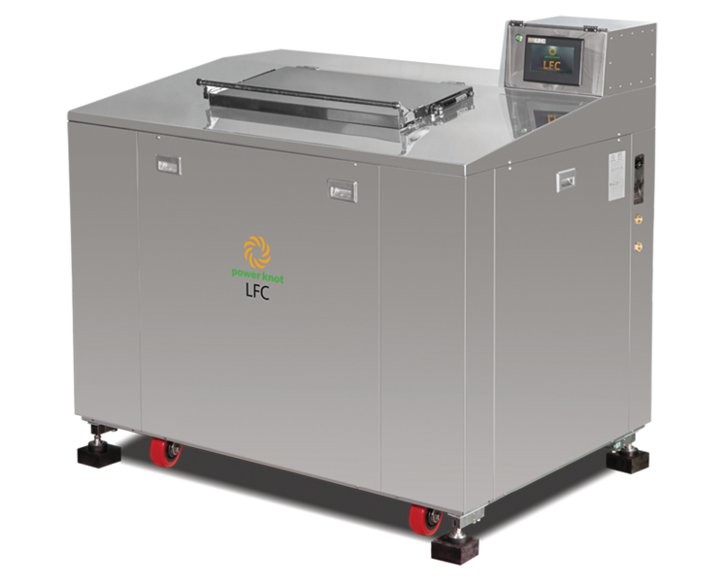Power Knot's on-site composting systems turn solid food waste into drain-safe wastewater
LFC Biodigester minimizes disposal costs, environmental footprint

The LFC from Power Knot is a biodigester that automatically converts solid food waste into drain-safe waste water. The operation is free of odour, slashes the costs for the disposal of waste, and greatly benefits the environment. Continuous bio-digestion allows food waste to be added at any time.
As one of six models currently available, the LFC-300 (shown here) can digest up to 500 kg (1200 lb) of organic waste per day. The unit can compost anything edible, including fruits, vegetables, raw and cooked meat, fish, cheese, bread, rice, and noodles. The compact stainless steel unit is intended for on-site installation at commercial or institutional food preparation and distribution facilities including restaurants, hotels, schools, supermarkets, hospitals, nursing homes, theme parks, corporations, military canteens, prisons, ships, island properties and food resellers.
In the machine, a horizontal agitator rotates slowly within the U-shaped vessel to maximize contact between solid food waste, bacteria, air, water and Powerzyme proprietary enzymes residing in porous plastic chips that remain in the vessel. The digestion process is aerobic (uses air) and exothermic (releases heat), raising the vessel temperature to about 42°C (108°F) which, along with automated infusions of hot and cold water, maximizes the rate of decomposition.
Liquids resulting from bio-digestion drain continuously through a screen along the bottom of the vessel, to an outlet at one end of the vessel and into any municipal drain. Since the grey water is rich in nutrients, it can also be plumbed into irrigation systems for lawns, shrubbery beds and crops.
Load cells supporting each corner of the LFC-300 transmit the weight of food waste added and digested, to an accuracy of ±1%, to a PLC which records and displays waste volume reduced, landfill gas avoided and other statistics, which can be viewed on a touch screen or accessed via the cloud.
By eliminating solid food waste hauling costs and minimizing energy usage, these systems typically pay for themselves in six to 24 months, according to Power Knot. This system also minimizes the user's carbon footprint by precluding the emission of the 100+ tons/yr of CO2 that the equivalent waste would generate at a landfill, while eliminating the production of methane which is 84-times more harmful to the atmosphere than CO2.
Five models of the LFC offer capacities from 20 to 1800 kg/day (45 to 4000 lb/day).
According to Power Knot customer Eddie Rodriquez, warehouse manager, Ace Natural Inc.,"Previously, we collected and wrapped outdated and damaged produce on pallets, stored it in the warehouse refrigerator, and shipped it weekly to a solids composting facility, at significant cost. Our LFC eliminates these costs and frees up valuable refrigerator space."
Lindsey Llarazara, kitchen manager, Arthur I. Meyer Jewish Academy, said "We used to take out the trash three or four times a day. Now, we empty our garbage cans once a day. That allows us to schedule fewer garbage pick-ups in a week - most of the time, only one."



